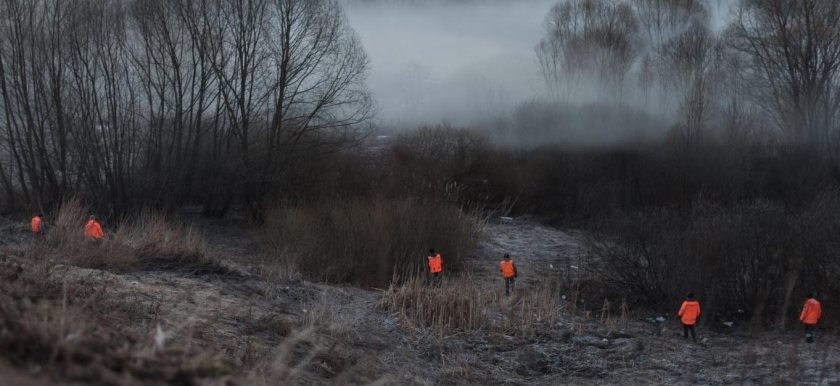Rodnyansky said that although the film was about “Russian life, Russian society and Russian anguish ... it’s not specifically Russian, I believe it is very universal.” ( Hilarious early selfie stick from 69 Czechoslovak sci-fi movie - Business Insider)
“(Director) Andrey Zvyagintsev can’t come right out and declare, in bright sharp colors, the full corruption of his society, but ... he can make one like ‘Loveless’, which takes an ominous, reverberating look, not at the politics of Russia, but at the crisis of empathy at the culture’s core,” wrote Variety’s Owen Gleiberman.
The film’s producer told reporters why “Loveless” had been made without the government funding that the Oscar-nominated “Leviathan” had received.
“The ministry of culture of Russia went to great pain to emphasize how they dislike Leviathan and their desire to avoid any repetition of this kind of mistake in the future,” Alexander Rodnyansky told a news conference, speaking in English.
“That’s why I decided that we don’t need to embarrass them again and decided to do the movie on our own.”
Loveless review – a lost boy in a toxic world | Film | The Guardian
'Loveless' Producer on Differing Reactions to Andrey Zvyagintsev Movie – Variety
Loveless: How Russian director is taking aim at life under Putin through the ugliness of divorce | The Independent

Loveless (Nelyubov) (2018) - Rotten Tomatoes
Loveless review: Andrey Zvyagintsev's pristine drama is a pitiless critique on Russia - The Telegraph
'Loveless', a film about people that politicians will hate, screens at Cannes - Reuters
Andrey Zvyagintsev was born in Novosibirsk, Siberia. At the age of 20 in 1984, he graduated from the drama school in Novosibirsk as an actor. Since 1986, he has lived in Moscow where he continued his studies at the Russian Academy of Theatre Arts until 1990. From 1992 to 2000, he worked as an actor for film and theater. In 2000, he began to work for the TV station REN TV and directed three episodes of the television series The Black Room.
I loved the film. It is very carefully and beautifully made. I agree with you there is a commentary on contemporary Russian society present, and like you I know hardly anything about Russia.
My own experience - I became aware during the film (or perhaps this happened shortly afterward when I was thinking about it) that the narrative contained a number of Mothers. The principle character was obviously a Mother; she had a Mother herself (who could forget!); her husband's lover was a Mother to be, and her Mother was included also. Do I remember a discussion near the beginning of the film with a beautician complaining about her daughter? Mothers everywhere. Reddit True Film
And what was our impression of Motherhood in this film? How were the Mothers doing? Frankly they were, in one way or another, monstrous. All that we could see was pain - pain and suffering passed down through generations of Mothers.
And of course, over and above all them hovered the Mother of all Mothers; Mother Russia herself (the spirit of Russia has historically been represented as maternal female). The scene others have alluded to where the central character is on the treadmill in her 'Russia' sports top is indeed highly symbolic. Here is Mother Russia, on a treadmill, running to nowhere, and quickly running out of steam. She is bitter, numb, and utterly loveless. Where are her children? What has she done to her children? In the background Russia's conflict in Ukraine is covered in disturbing detail on the tv news.
I can't help thinking Zvyaginstev is a hell of a brave man. The film is terribly, bleakly condemning of Russia in a more or less explicit fashion. This is a country where figures who stand in opposition to the government are still 'disappeared' or even gunned down in the street. This must be more than artistic daring on the part of the director. He must be putting his personal safety at risk. At any rate, it seems highly likely he would be on a 'list' - his movements closely watched. In this way he becomes part of a Russian cinematic legacy that extends all the way back to Eisenstein.
Actually, none of us fashions our own fate. We’re born in a particular place and time and most of the things that happen to us are outside of our control .. JC and CJ might be alive today, but tomorrow they both might be in a plane crash
Cold River is bloody rich in ambiguity
Gray chose his title with reference to Seven Types of Ambiguity by the poet, critic and “misotheist” William Empson, in which Empson said “that far from ambiguity being a defect in language, it’s what makes it so rich. Without ambiguity we couldn’t deal with the world. I think the same is true of atheism and religion. They’re fluid. They’re multiple. They’re plural. They flow into each other in different ways . . . It enables us to have a wide variety of frameworks we can call on when we’re dealing with the experience of being human.”
Like Jozko Imrich, Janko Gray has been called a misanthrope and a nihilist. But he doesn't believe that social improvements are impossible — only that they're reversible... Three Steps Forward Seven Backward
Algorithms and the end of taste. Taste is a moral capacity, an ability to recognize truth and beauty. It was once a human quality. Now it's a digital product... Steketee on Truth
APR 2018
Automated welfare didn’t end with the robo-debt controversy. Here and overseas, governments are turning vital decisions over to computers.
APR 2018
The author of the controversial Silent Invasion argues it's not the book, but the reaction to it, that has highlighted something troubling in Australian intellectual life.